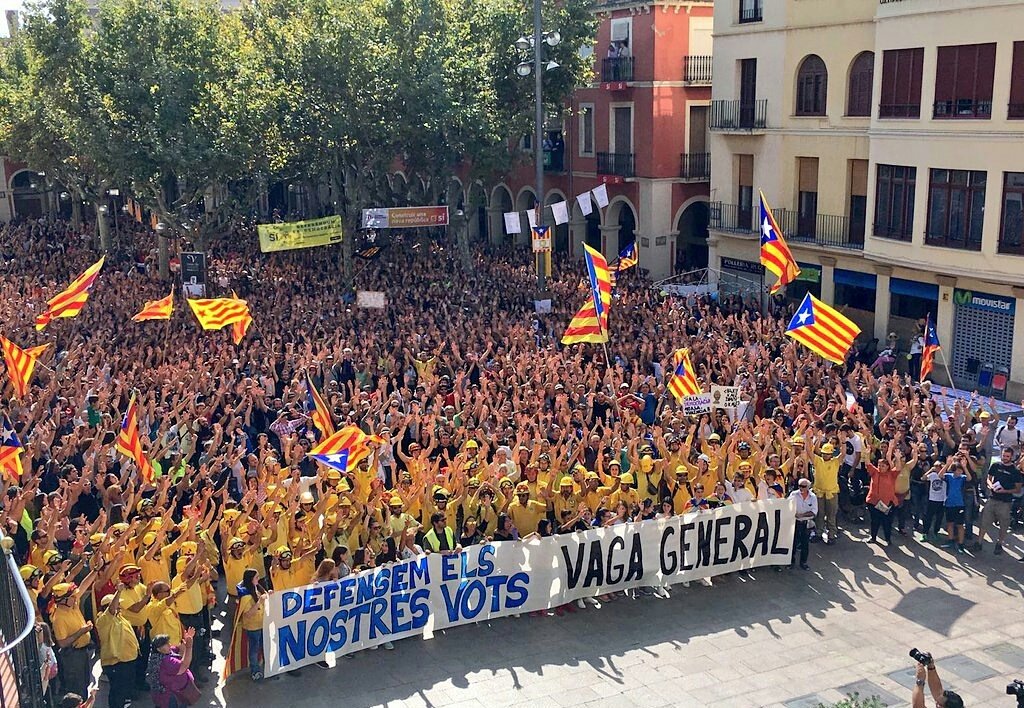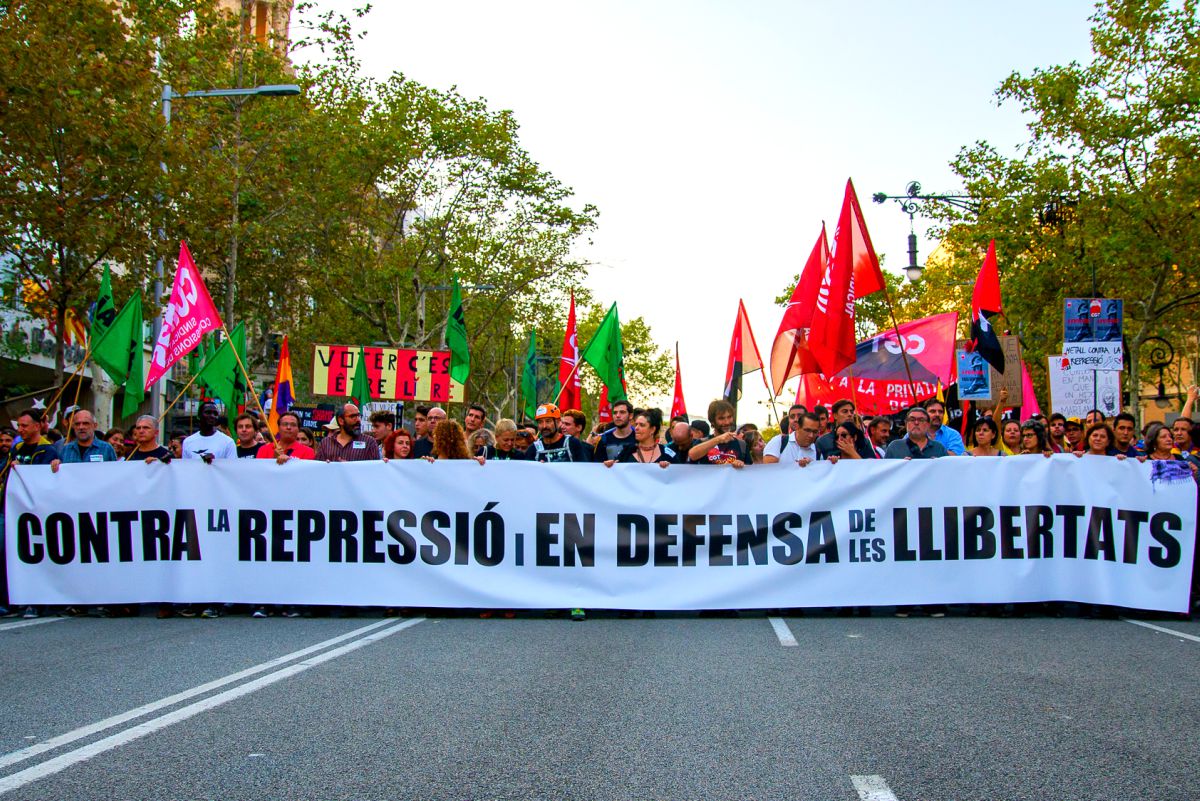Today is the National Day of Catalonia. We publish here the latest editorial from Revolució: magazine of the International Marxist Tendency in Catalonia, which provides a balance sheet of the political situation in Catalonia and the rest of the Spanish state, and explains the tasks ahead for the left wing of the Republican movement.
One year after the 1 October independence referendum, it is time to take stock. After those historical battles, after the heroic efforts of the Catalan people fighting for their rights and freedoms, where are we today? The situation is not very favourable. On the contrary, in the Republican field, demoralisation and confusion predominate.
The repression of the Spanish state has not diminished at all, despite the fall of Rajoy. The Ministers of the old Catalan government (with the exception of Santi Vila) remain in exile or in prison, awaiting trial. The transfer of those imprisoned to jails in Catalonia by the Pedro Sánchez government is a miserly concession: nothing more than a crumb. The repression of the Spanish state has fallen on dozens of activists who face fines and jail sentences.
What is even worse is that unionist parties, especially Ciudadanos, have continued their hate campaign aimed at dividing the Catalan population along national lines, fermenting violence and generating a favourable environment for the growth of fascist groups.
At the same time, however, the difficulties of the independence movement are not exclusively due to repression. We must also settle accounts with the leaders of the movement. The truth is that PDECAT and ERC have systematically capitulated when faced with the Spanish state’s blackmail. The government of Quim Torra is hardly the government of an autonomous region. In fact, it has fewer powers and freedoms than the Generalitat enjoyed a year ago.
Again, PDECAT and ERC have used repression as an excuse to justify their inertia. But we must ask: has their cowardly attitude helped the prisoners and exiles in any way? No, in fact it has been totally counterproductive. It has only encouraged the Spanish state, because weakness invites aggression.
Today, the Republican rhetoric of Torra and his advisers is the tiresome, duplicitous and pathetic demagoguery of a defeated government, frightened and prostrate before the Spanish state, without any perspective or will to struggle, desperate to cling to its position.
A revolutionary task
The picture today seems bleak. We must be honest: under these conditions, it is impossible to establish the republic immediately. Even so, the events of the past year will not have passed in vain if the Republican activists draw the necessary lessons.
What conclusion must we draw from everything that has happened? In the Spanish state, the right to self-determination is a revolutionary task. It pits us, not only against an authoritarian state hostile to the freedom of peoples, but also against the capitalist and imperialist system on which it rests, as we saw in the economic terrorism campaign conducted by Catalan and Spanish big business; and the cynical attitude of the European Union and the ‘international community’.
A revolutionary task needs a revolutionary leadership. It cannot be carried out by reformist and petty-bourgeois parties such as the PDECAT or ERC. And a revolutionary struggle also needs to enthuse and mobilise a decisive majority of the population, fundamentally the most revolutionary social class in society: the working class.
It is necessary to rebuild the Republican leadership, moving its political axis to the left and its social axis towards the working class. How can this be done?
The Republican camp is rarified, many people are disappointed. To break this disintegration, we must build a pole of attraction that will give confidence and enthusiasm to our movement, with a clear vision, programme and roadmap.
Committees for the Defence of the Republic
 In our opinion, this task corresponds to the Committees for the Defence of the Republic (CDRs), because of their breadth, militancy and the political authority they have earned.
In our opinion, this task corresponds to the Committees for the Defence of the Republic (CDRs), because of their breadth, militancy and the political authority they have earned.
It is true that, at present, the CDRs have lost part of their strength and energy: victims of the general ebb. In many places, they have fallen into a routine and demoralising localism that has emptied them out.
These difficulties cannot be overcome simply by force of will, with the radical actions of small minorities: a political solution must be found. The committees must be brought back to life, centralised and armed politically. We need to meet, reflect, debate and clarify.
A national CDR conference – with delegates elected at each committee, debating and voting documents, and choosing a national leadership with a democratic mandate that will give the movement a common identity – would help overcome the fragmentation and confusion that exists.
The condition for this, however, must be total independence from and maximum distrust of the PDECAT-ERC bloc. The CDRs must see their task not as putting pressure on the Generalitat, but as offering an alternative to it. Strengthened and centralised politically and organisationally, the CDRs could again grow rapidly in the wake of events. Many Republicans are looking for answers and alternatives, and could find them in the CDRs.
For a revolutionary leadership
 In this sense, the CUP, the most consistent Republican party, has an important role to play. Its membership (and the pro-independence left in general) has been very active in the CDRs and in many places it has built and led them, acquiring a great authority.
In this sense, the CUP, the most consistent Republican party, has an important role to play. Its membership (and the pro-independence left in general) has been very active in the CDRs and in many places it has built and led them, acquiring a great authority.
The CUP should not hesitate to take its views, slogans and perspectives to the CDRs, carrying out not only organisational but also political work, simultaneously winning over the best Republican activists to its ranks, and proudly displaying its banner.
The task of reconfiguring and uniting the Republican camp around a new leadership, however, is not the greatest challenge we have to face. It is necessary to break the division that is opening up within the Catalan working class along national lines, largely due to the poison introduced by Ciudadanos. This can only be done with a working-class policy.
Unite the working class
 According to Adecco, the average wages in Catalonia have gone down by €400 since 2016, in the middle of an economic ‘recovery’, no less. At the same time, the number of Catalan millionaires increased by 577 between 2015 and 2016. There are unprecedented levels of exploitation and inequality.
According to Adecco, the average wages in Catalonia have gone down by €400 since 2016, in the middle of an economic ‘recovery’, no less. At the same time, the number of Catalan millionaires increased by 577 between 2015 and 2016. There are unprecedented levels of exploitation and inequality.
If all the frustration accumulated after 10 years of crisis is channelled into mass mobilisation, the state will be finished. In fact, one has to understand the class meaning of the politics of Ciudadanos leader, Albert Rivera and Popular Party leader, Pablo Casado. Social injustice throughout the Spanish state is such that the obscene privileges of capitalists can only be maintained by dividing the exploited along racial and, indeed, national lines.
It is a priority to link national self-determination to social rights, explaining that the state that represses the independence movement is the same that cuts rights and public services; that ‘Spain’ does not belong to those who hang the ‘rojigualda’ flag on balconies, but to the oligarchs of the IBEX-35.
The CUP explained it very well with its “decrees of dignity”. The problem is that the CUP remains a minority party. In addition, the CUP, unfortunately, compromised itself by approving the old austerity budgets and is still paying the price for it.
The truth is that most workers with Spanish national identity in Catalonia associate independence with Quim Torra and co: that is, with an identitarian nationalism that is not much different from Ciudadanos when it comes to social policies. This makes it even more necessary to build a new Republican bastion around the CDRs, in order to break with the PDECAT-ERC bloc and to become armed with a clearly social and working class program – a socialist program.
Internationalism
 But the national division of Catalan workers cannot be overcome by class politics alone. Internationalism is equally important. To build bridges with the class struggle and the militant left throughout the Spanish state should be a priority. This would bring us closer to our natural allies, the working class and the youth of the rest of the peninsula, helping us to overcome the distrust that the Spanish right wing sows towards Catalonia, and undermine the regime from within.
But the national division of Catalan workers cannot be overcome by class politics alone. Internationalism is equally important. To build bridges with the class struggle and the militant left throughout the Spanish state should be a priority. This would bring us closer to our natural allies, the working class and the youth of the rest of the peninsula, helping us to overcome the distrust that the Spanish right wing sows towards Catalonia, and undermine the regime from within.
The most important thing is that an active, internationalist policy on the part of the CUP and the CDRs would send a message to the workers in Catalonia who feel Spanish, making them see, not in words but in facts, that Catalan Republicanism rejects identity-based nationalism and looks for fraternal and close relationships with our class brothers and sisters outside of Catalonia.
The Spanish state tour undertaken by CUP deputy Vidal Aragonés, and the CDR delegation to Madrid on Republic Day on 14 April are steps in the right direction, but still insufficient. We must openly challenge the Spanish militant left wing to establish a common front against the 1978 regime. You could start with the CUP and the CDRs advancing the slogan of a demonstration in Madrid against repression and the neo-Francoist wave.
The mood of superficial calm that exists throughout the Spanish state is a mirage, produced by the predictable passivity of the PSOE, and the tail-endism and lack of action by Unidos Podemos.
But beneath the surface, the contradictions; indignation against casualisation, exploitation and inequality; and disgust towards the reactionary character of the state are accumulating. The women’s strike on 8 March, the pensioners’ demonstrations, the Altsasu movement against repression, and the strikes at Amazon and Ryanair are indications of this.
We have to prepare for future outbursts and offer them a friendly hand from Catalonia.
- No confidence in the PDECAT-ERC bloc
- Strengthen the CUP with class independence
- Build the CDRs, arm them politically
- Towards a national CDR conference
- Let us break national divisions with socialism and internationalism!
- Build bridges with the struggles across the Spanish state!
- In order to achieve the republic, we need a revolution!






